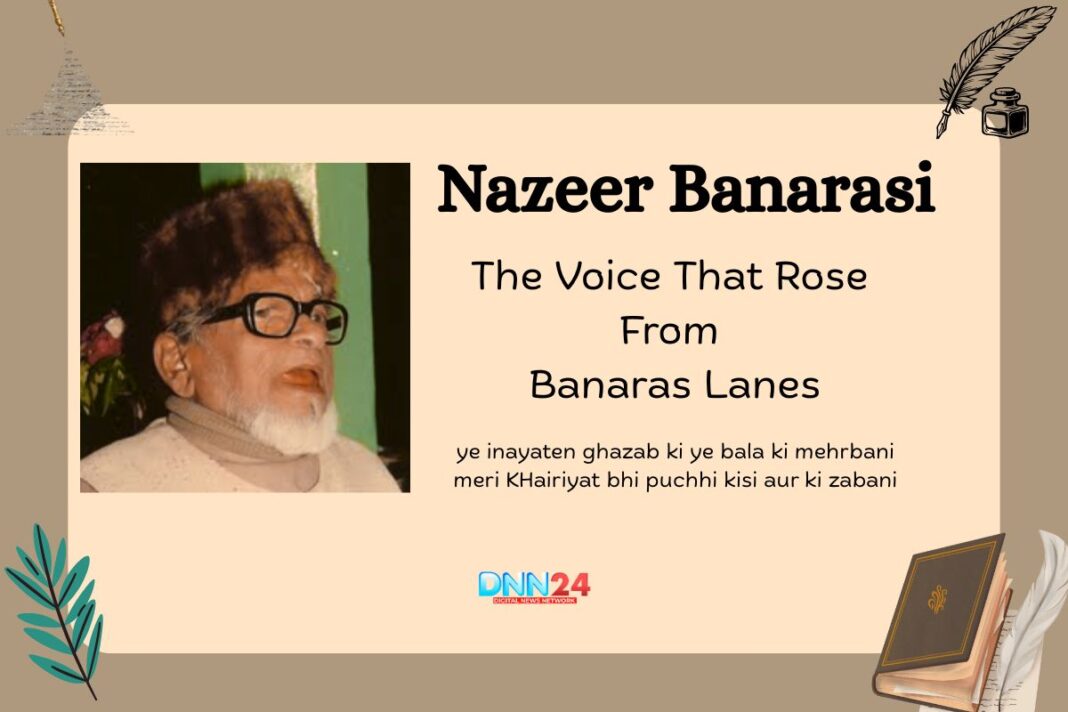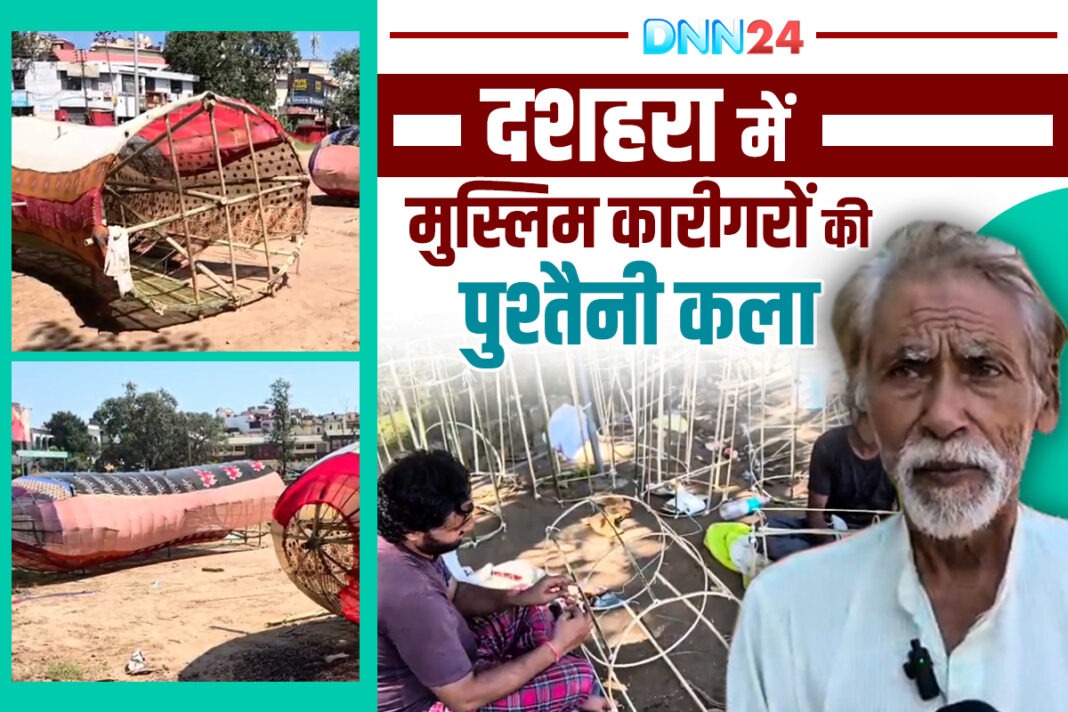Nazeer Banarasi was born as Nazeer Ahmad on November 25, 1909, in the ancient city of Banaras, now known as Varanasi. His life was a mirror to the soul of familiar India. The narrow lanes where he walked, the temples and mosques that stood side by side, the boatmen on the Ganga, and the struggles of ordinary people became the raw material for his poetry.
andhera maangne aaya tha roshni ki bheek
Nazeer Banarasi
ham apna ghar na jalate to aur kya karte
His family practised Unani medicine, a tradition of healing passed down through generations. His elder brother, Hakeem Mohd Yaseen Maseeh, taught him this art of treatment. But Nazeer found another path. He discovered that words could heal wounds that medicines could not touch. He chose poetry as his medicine for a divided nation.
umr bhar ki baat bigdi ik zara si baat mein
Nazeer Banarasi
ek lamha zindagi bhar ki kamaai kha gaya
Through the turbulent decades of twentieth-century India, his verses carried the fragrance of Banaras across the country. His poems were not just entertainment for the educated class. They were the voice of the voiceless, the hope of the struggling, and the bridge between communities that history tried to tear apart. Today, his legacy reminds us that one person, armed with a pen and a pure heart, can change how millions perceive the world.
bad-gumani ko badha kar tum ne ye kya kar diya
Nazeer Banarasi
khud bhi tanha ho gaye mujh ko bhi tanha kar diya
Growing Up Where Sacred Meets the Street
Banaras has always been a city where contradictions coexist peacefully. The holy Ganga flows past temples and cremation grounds. Morning prayers mix with the calls from minarets. This was the world that shaped young Nazeer. His family was renowned for their healing practice, treating patients not only with herbs and compounds but also with genuine compassion. As a child, Nazeer absorbed everything around him.
ye inayaten ghazab ki ye bala ki mehrbani
Nazeer Banarasi
miri khairiyat bhi poochhi kisi aur ki zabani
He listened to the stories of saints and mystics. He watched the boatmen struggle for their daily bread. He heard the temple bells and the azaan with equal reverence. His elder brother became his teacher, guiding him through medical texts and the more profound philosophies that floated in the air of Kashi. But life was not gentle with the family. They faced losses, financial troubles, and the constant tension between different communities that marked those years.
ek deewane ko jo aaye hain samjhane kai
Nazeer Banarasi
pahle main deewana tha aur ab hain deewane kai
Many people would have grown bitter from such experiences. Nazeer chose a different response. He turned every pain into understanding, every loss into a lesson about human connection. The struggles of his childhood did not harden his heart. Instead, they made him more sensitive to the suffering of others. This sensitivity became the foundation of his poetry, making his words touch hearts across all barriers of religion, caste, and class.
ye karein aur vo karein aisa karein waisa karein
Nazeer Banarasi
zindagi do din ki hai do din mein ham kya kya karein
Poetry Born From Fire and Tears
What made Nazeer Banarasi different from other poets was not just his beautiful language. It was how his own struggles gave weight and truth to his words. Banaras, despite its spiritual reputation, was not free from the harsh realities of poverty, discrimination, and conflict. As a young man, Nazeer saw the horrors of the partition period. The violence and hatred of those days left deep scars on the national conscience.
miri be-zaban aankhon se gire hain chand qatre
Nazeer Banarasi
vo samajh saken to aansu na samajh saken to paani
But instead of writing poems of anger or revenge, Nazeer wrote about hope and reunion. His morning walks along the ghats became moments of creation. Watching the sun paint the Ganga with light, he composed verses that would later challenge the voices of division. During the 1962 war with China, he wrote something that shocked many people. He asked the nation to celebrate a different kind of Holi, one where people shed blood for their country rather than colored water for fun.
dil ki ujadhi hui haalat pe na jaaye koi
Nazeer Banarasi
shahr aabaad hue hain isi veerane se
He turned a festival into a metaphor for sacrifice and unity. This bold stance brought him trouble. Critics accused him of disrespecting traditions. Fundamentalists threatened him. But Nazeer stood firm, saying that poetry must serve the nation, not just sit in libraries. He faced loneliness and social exclusion for his views. These dark periods of his life became the most potent fuel for his art. His pain taught him a truth that he shared through every poem: the deepest wounds often give rise to the brightest light.
ji mein aata hai ki den parde se parde ka jawab
Nazeer Banarasi
ham se vo parda karein duniya se ham parda karein
Songs of a United Homeland
Every collection that Nazeer Banarasi published was a milestone in Indian poetry. His books, like Gang-o-Jaman, Rashtra ki Amanat Rashtra ke Hawale, Jawahar se Lal Tak, and Ghulami se Azaadi Tak, were not written for elite literary circles. They were written for the ordinary people whose lives they described. His ghazals captured the laughter of Holi celebrations, the warmth of shared festivals, and the quiet tears of mothers and workers.
vo aaina hoon jo kabhi kamre mein saja tha
Nazeer Banarasi
ab gir ke jo toota hoon to raste mein pada hoon
When he wrote about heartbreak, as in the famous line about people calling him mad and walking away, he was also offering strength to anyone who felt misunderstood. His special genius was using festivals as symbols for larger truths. For Nazeer, Holi was not just about colours and joy. It was about the meeting of hearts, about forgiveness and new beginnings. Diwali was not just about lamps and sweets. It represented the human capacity to find light in darkness. He believed that after every separation, there must be a reunion.
dusron se kab talak ham pyaas ka shikwa karein
Nazeer Banarasi
lao tesha ek dariya doosra paida karein
After every conflict, there must be reconciliation. His poetry during national crises always called for a collective spirit rather than division. Even when writing about his personal sorrows, he found hope and offered it to readers. His line about taking pleasure in weeping while encouraging others to smile showed his philosophy: accept your pain but never spread it to others. This wisdom made his poetry both profoundly personal and universally relevant.
raasta roke hue kab se khadi hai duniya
Nazeer Banarasi
na idhar hoti hai zalim na udhar hoti hai
A Humble Giant Who Changed India
Nazeer Banarasi never moved to Delhi or Mumbai to chase fame in bigger literary circles. He remained in his beloved Banaras, serving his community with both medicine and poetry. This choice made him different from many of his contemporaries. His humility was not weakness. It was a conscious decision to stay rooted in the soil that gave him his voice. The people of Banaras did not see him as a distant intellectual.
aas hi se dil mein paida zindagi hone lagi
Nazeer Banarasi
shama jalne bhi na paayi roshni hone lagi
He was one of them, walking the same streets, facing similar struggles, yet transforming ordinary experiences into extraordinary art. His years of patience with critics, his courage to speak as a minority voice, and his refusal to compromise his principles for popularity made his story even more powerful. Today, when festivals light up the lanes of Varanasi, his words still echo in gatherings large and small.
ek jhonka is tarah zanjeer-e-dar khadka gaya
Nazeer Banarasi
main ye samjha bhoolne waale ko main yaad aa gaya
Lovers of Urdu poetry across India remember him not just for his beautiful verses, but for the values those verses embodied. His legacy is not confined to books on library shelves. It lives in how people think about unity, kindness, and hope. Through decades of writing, Nazeer taught an entire generation what it means to resist despair. He showed that togetherness is not just an ideal but a daily practice. His life proved that true revolution does not always need loud slogans. Sometimes it needs quiet, persistent voices that refuse to stop believing in humanity’s goodness.
Also Read: Deep Narayan Nayak: Teacher of the Street Who Turned Walls into Blackboards
You can connect with DNN24 on Facebook, Twitter, and Instagram and subscribe to our YouTube channel.



